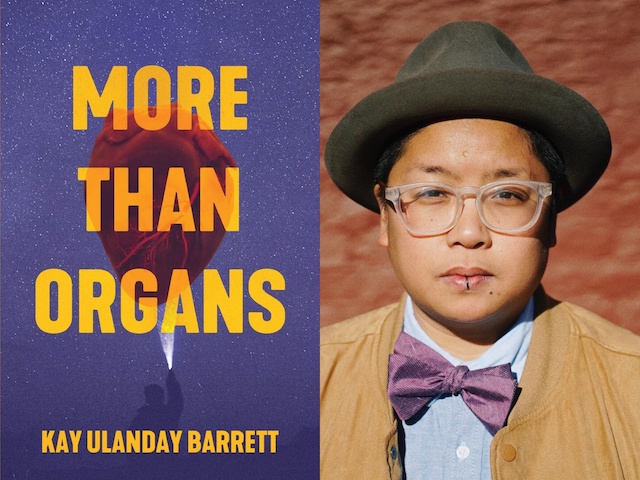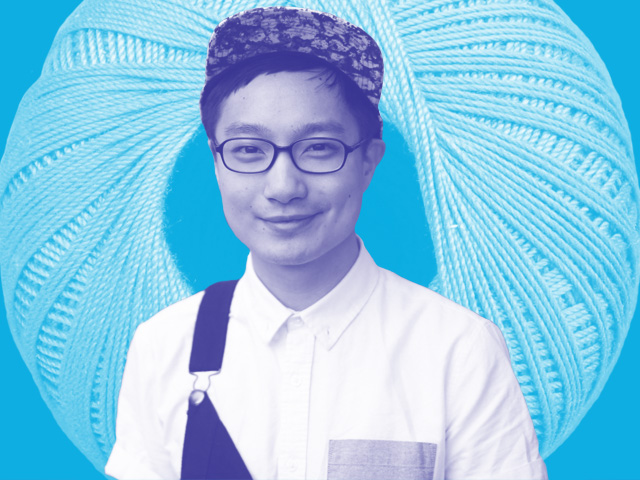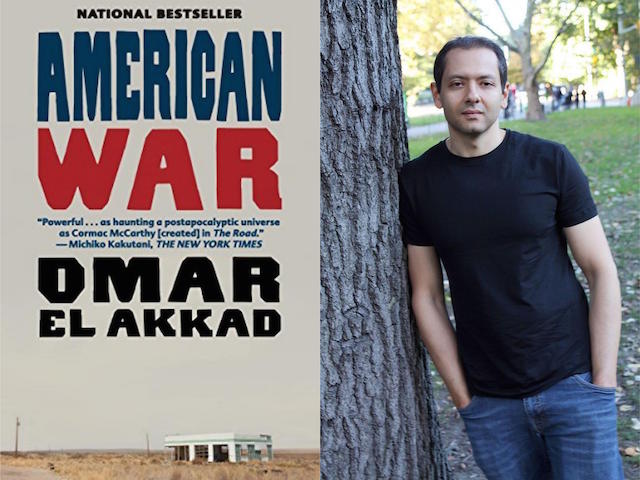“Together we are as mighty as our ancestors up from the dead.”

April 12, 2021
For Kay Ulanday Barrett, poetry is not a luxury. It is an ode to aunties who “measure rice by palm lines.” It is a love letter to trans and queer kin for whom “dance floors have always been altar.” It is for sick and disabled family whose “cane is a drum-song” and stories tell of “part starlight.” In More Than Organs, Kay asks “what stories does your blood tell?” and answers over and over.
In this second collection of poems, Kay takes us from childhood as one of the few brown people in Mackinaw, MI to navigating transhood, post-gender affirmation surgeries, and the medical-industrial complex. They dive into the “choreography of loss,” grieving the loss of a mother, to a post-apocalyptic climate crisis where “air is a thicket or jar of jam.” Kay’s poems themselves are vehicles to channel the grief, rage, and fury living in, and fighting the injustices in an empire bent on ravaging the lives of sick, disabled, queer, and trans people of color.
In the tumult and atrocities, there is also deep love. More Than Organs is an exploration of mahal, a Tagalog word that Kay opens his book with, that means both love and expensive. From “aunties love it when seafood is on sale” to “Earthbenders are Black and Brown Girls,” Kay is unapologetic of their love for family—from extended lolas and titos to trans and queer sibs. His poems work to cultivate internal safety in a world that has not been safe. He declares, “Let lonely make a lens so clear you become intergalactic.”
In a time of great interpersonal and societal grieving, craving for connection across time and space, and one that asks for a radical reimagining of the world as we know it, More Than Organs offers respite, heart, and vision for ways we can do this and a portal to how we can arrive.
—huiying b. chan
huiying b. chan: Your poems are a clear paying of homage to the aunties who you grew up with, and also to your past selves. Can you talk more about the themes of lineage and legacy in your book?
KUB: Growing up as a child of migrants, in a mixed-status household, I think it’s really critical for me to name the people who came before me. This means in several regards: sick, disabled, queer, people of color who came before me, people in my ancestral bloodline, other trans people of color, non-binary people of color who came before me. I don’t have any blood family who are alive right now. As somebody who was kicked out and estranged as a kid, my current living situation, like it is for so many queer people, even at my age in [my] 30s, is very tenuous. It’s just so critical for me to pay homage to the people that brought me here, the people that taught me how to survive in this world. And that’s not just people in my blood, but in my book, it’s literally like the people on my stoop in Whipple Street, that is my auntie Yoly, who was my grandfather’s sister, and my lolo, Guillermo Ulanday.
As a young person, I was super genderqueer, huiying, I was like super confident! And they were like, whatever you want. I wanted to share with the public that I had elders who uplifted me, which is very different than the dynamic that oftentimes white supremacy [maintains]: these backwards Asians, these backwards cultures. No, my family, besides my mother actually, if they were still living, would have my back. I think it’s really important to name that too.
I can’t cite any trans elders that are in my family line. So then that brings up, who are the other trans people of color, who I feel have paved the way for my freedom? And you know, as queer, trans people, we have to create extended chosen family. It’s really important for us, especially now, to feel rooted, or to find our roots, and to find out wow, we come from someplace. We’re not just some made-up fissure of American imagination. This isn’t a new trend. Trans people have always been. Trans people of color have always been. Non-binary people have always been in every culture, whether it’s Two-spirit, Babaylan, Hijra, whatever it is, there has always been.
It’s colonialism, white supremacy, ableism and the white gaze, essentially, that has obliterated my ancestors. Let me be real, I didn’t just create this work, there were other trans people of color and disabled queer people trying to create poetry books but systemically didn’t get the opportunities or resources that I had. I’m just trying to find answers, and the answers are beyond my own body.
hbc: When you talk about your work, your gigs and performances, you mention often being the only person of color, queer, disabled writer in the room. You talk about poetry institutions that exclude and tokenize. What do you see as an alternative for pursuing and living poetry outside of these institutions?
KUB: I’ve always operated outside of that. So much of my career has nothing to do with poetry institutions. I knew that poetry institutions would not feed me. They don’t even want to acknowledge my whole body as a disabled person, as a trans person. Poets who are very successful, who have mainstream clout, just like in the real world, have to redistribute their resources and realize that popularity is a sham. Every field of art has the cool kids. And those could be Black, Indigenous, people of color. But there’s always an elite. It’s not just white supremacy; it’s how many of us, including myself, have digested white supremacy, and how we engage in competition with one another. That’s why I respect your work, and many other people’s work, because writing is a vehicle for politics.
Poetry is a vehicle. It’s merely a conduit. I don’t think poetry is enough. I think you can be political as a poet and talk about political things that happened to you on a very individual level. Storytelling is super critical. But that doesn’t necessarily engage systemic change.
I am not a Yale poet. I am not an Iowa Workshop poet. But who has my books in their library? Asian American Studies. Restaurant workers have booked me because I talk about my mom and being a restaurant worker. I perform at social justice foundations. I perform for domestic workers. I know that poetry as an institution itself is not only faulty, but is rapidly connected to competition, ableism, and white supremacy. I don’t want a glorification of one. I want a collective communal connection for all.
hbc: What would your ancestors think of your book?
KUB: I think my ancestors would think my book is hilarious. I’m airing out some things they don’t want to talk about. I also think they miss me and I miss them. My mom had my first chapbook on a magnet on her refrigerator. And then she would take it off the fridge and put it in her purse during her night hours. And she told me when she was on the train, she would read it. So for me, I feel like my book is a portal.
hbc: That’s so beautiful. It really is. Can you tell me more about how love lives in your book?
KUB: Very rarely is there a love poem in my performance set. I think that’s for self-protection, of my own vulnerability, but also of people I love. For this book in particular, a poem [that is] really important to me, looking at romance, is “I just want softness on my mouth.” I wanted to talk about that crush momentum. To be queer and to fumble, to long for someone. What does it mean when you create a guise of a person and you don’t know if that’s really them? There’s something about queer love and queer lust in that way.
Another poem that feels like a love poem to me is “Earthbenders are Black and Brown Girls.” To me, it’s about what is it to love young, brown and Black girls, and curiosity, and their search and their journey? It’s not necessarily romantic. It’s just me as a “young girl of color” who was forced to be perceived as cisgender. What is it to love her? What is it to love Black and brown women of color who grew up in a world that is so vehemently violent? There’s always love in the placement of my work.
The very title itself, More than Organs—it’s being loved for more than your body, and also being loved for what your body is. There’s this loneliness about that poem, the way it ends: say hello, say I missed you, say please stay with me here, say please stay with me, say please stay, say please. There’s this pining. I’ve always been a piner. And I think that happens from oppression and isolation. When you’re longing for something deeper than what the Earth, or what capitalism or white supremacy gives you. And to me, that’s a form of love. To always be hungry, to always be thirsty for what you deserve. So what does a Crip body in pain being loved as is, a spasming body in pain—as gorgeous and resilient as that is, but also what a nightmare. And to be loved in all of that. That’s really important to me too, that kind of love, that kind of SDQ, sick and disabled queer ingenuity.
hbc: More than Organs recently won a 2021 Stonewall Book Award from the American Library Association. Major congratulations. How did you feel when you first won the award?
KUB: When I heard, I just cried. I frequently write to just feel real. To actualize my existence and those similar to me, that we are breathing. Awards and lists as we know can be performative, elitist, and the same inner circles being re-validated. That’s the opposite of what I want poetry to be.
I think this award coming from the American Library Association, and it being the award that I personally consider the queer and trans nerdy award is frankly wonderful. It feels like validation, honestly, especially since my work is hybrid, not conventionally considered literary.
Poetry for me is always queer forward, non-binary-centered, and trans-informed. It’s meant to create justice talk. My high school bestie congratulated me saying that because of my work and that sticker, likely every Chicago Public high school and public library will have my book available. This means a poor kid of color, who’s possibly realizing their queer and, or trans and, or disabled magic will have the chance to connect with our shared lineages together.
These last few years have been rife with ache systemically and personally. For every award I’ve received, there are many opportunities that didn’t concretize, that people don’t see. I think I’m not the only one who feels frequently obliterated. Knowing a group of people decided to expand the echo of my book via this award feels incredible. Nothing brings me more joy. Thank you to every reader who is depressed, brown, queer, has a migrant mama, and loathes the limitations of gender. Thank you for staying and trying to be here together.



